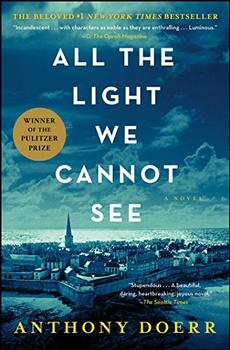Summary | Excerpt | Reading Guide | Reviews | Beyond the Book | Readalikes | Genres & Themes | Author Bio

Werner can hear the Austrians two floors up scrambling, reloading, and the receding screams of both shells as they hurtle above the ocean, already two or three miles away. One of the soldiers, he realizes, is singing. Or maybe it is more than one. Maybe they are all singing. Eight Luftwaffe men, none of whom will survive the hour, singing a love song to their queen.
Werner chases the beam of his field light through the lobby. The big gun detonates a third time, and glass shatters somewhere close by, and torrents of soot rattle down the chimney, and the walls of the hotel toll like a struck bell. Werner worries that the sound will knock the teeth from his gums.
He drags open the cellar door and pauses a moment, vision swimming. "This is it?" he asks. "They're really coming?"
But who is there to answer?
Saint-Malo
Up and down the lanes, the last unevacuated townspeople wake, groan, sigh. Spinsters, prostitutes, men over sixty. Procrastinators, collaborators, disbelievers, drunks. Nuns of every order. The poor. The stubborn. The blind.
Some hurry to bomb shelters. Some tell themselves it is merely a drill. Some linger to grab a blanket or a prayer book or a deck of playing cards.
D-day was two months ago. Cherbourg has been liberated, Caen liberated, Rennes too. Half of western France is free. In the east, the Soviets have retaken Minsk; the Polish Home Army is revolting in Warsaw; a few newspapers have become bold enough to suggest that the tide has turned.
But not here. Not this last citadel at the edge of the continent, this final German strongpoint on the Breton coast.
Here, people whisper, the Germans have renovated two kilometers of subterranean corridors under the medieval walls; they have built new defenses, new conduits, new escape routes, underground complexes of bewildering intricacy. Beneath the peninsular fort of La Cité, across the river from the old city, there are rooms of bandages, rooms of ammunition, even an underground hospital, or so it is believed. There is air-conditioning, a two-hundred-thousand-liter water tank, a direct line to Berlin. There are flame-throwing booby traps, a net of pillboxes with periscopic sights; they have stockpiled enough ordnance to spray shells into the sea all day, every day, for a year.
Here, they whisper, are a thousand Germans ready to die. Or five thousand. Maybe more.
Saint-Malo: Water surrounds the city on four sides. Its link to the rest of France is tenuous: a causeway, a bridge, a spit of sand. We are Malouins first, say the people of Saint-Malo. Bretons next. French if there's anything left over.
In stormy light, its granite glows blue. At the highest tides, the sea creeps into basements at the very center of town. At the lowest tides, the barnacled ribs of a thousand shipwrecks stick out above the sea.
For three thousand years, this little promontory has known sieges.
But never like this.
A grandmother lifts a fussy toddler to her chest. A drunk, urinating in an alley outside Saint-Servan, a mile away, plucks a sheet of paper from a hedge. Urgent message to the inhabitants of this town, it says. Depart immediately to open country.
Anti-air batteries flash on the outer islands, and the big German guns inside the old city send another round of shells howling over the sea, and three hundred and eighty Frenchmen imprisoned on an island fortress called National, a quarter mile off the beach, huddle in a moonlit courtyard peering up.
Four years of occupation, and the roar of oncoming bombers is the roar of what? Deliverance? Extirpation?
The clack-clack of small-arms fire. The gravelly snare drums of flak. A dozen pigeons roosting on the cathedral spire cataract down its length and wheel out over the sea.
Number 4 rue Vauborel
Marie-Laure LeBlanc stands alone in her bedroom smelling a leaflet she cannot read. Sirens wail. She closes the shutters and relatches the window. Every second the airplanes draw closer; every second is a second lost. She should be rushing downstairs. She should be making for the corner of the kitchen where a little trapdoor opens into a cellar full of dust and mouse-chewed rugs and ancient trunks long unopened.Excerpted from All the Light We Cannot See by Anthony Doerr. Copyright © 2014 by Anthony Doerr. Excerpted with permission by Scribner, a Division of Simon & Schuster, Inc.




We should have a great fewer disputes in the world if words were taken for what they are
Click Here to find out who said this, as well as discovering other famous literary quotes!
Your guide toexceptional books
BookBrowse seeks out and recommends the best in contemporary fiction and nonfiction—books that not only engage and entertain but also deepen our understanding of ourselves and the world around us.